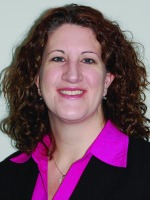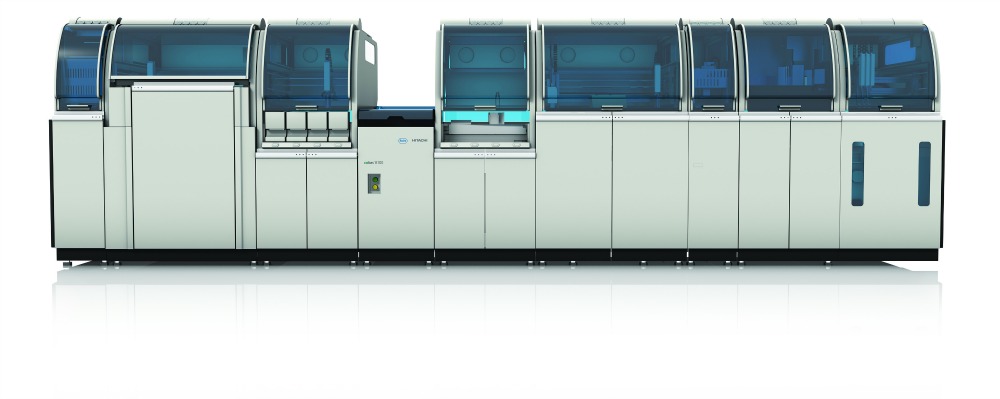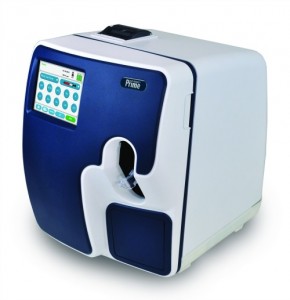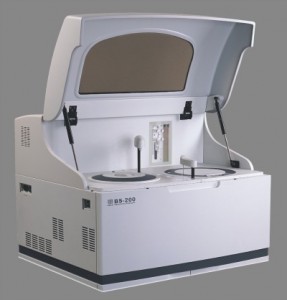Manufacturers of clinical chemistry analyzers adjust to changing market imperatives
By Karen Appold
Today’s clinical chemistry analyzers are designed with the end user in mind. Careful attention is given to such features as volume of testing, level of automation, level of system integration versus a modular approach, and the complexity category assigned under the Clinical Laboratory Improvement Amendments of 1988 (CLIA).
“Scalability and standardization offerings enable laboratories to define the analyzers they need to match the appropriate volume and standardized processes, reagents, and software,” says Steve Ishii, MT(ASCP), CLS, senior marketing manager for Beckman Coulter Diagnostics, Brea, Calif. Beckman Coulter’s portfolio includes chemistry analyzers designed to compete in any market size—from physician office labs (POLs) to community hospitals, and from core labs to high-volume reference labs. The company offers integration with preanalytical automation, immunoassays, and information technology (IT).
Awareness Technology Inc, Palm City, Fla, offers clinical chemistry and immunochemistry testing systems designed for low- to medium-throughput laboratories such as POLs, urgent care clinics, and small hospital laboratories. “These open systems have versatile software, making them a good choice for specialty testing, life sciences, and clinical research,” says Jamie Ristaino, national sales manager for Awareness Technology. “They are also dependable backup analyzers when an automatic system is down or a test doesn’t fit well on the main chemistry system.”
ChemWell, Awareness Technology’s comprehensive software package, is used to customize assays—including the number and volume of reagents, incubation times, number and timing of reads, calibration schemes, calculation options, quality control parameters, and interpretation flags. Users can even customize such specifications as the pipetting speed. The package also includes a full-feature patient database with several data management and reporting options—suitable for small labs that lack resources. The easy-to-use software includes a detailed owner’s manual to assist with training new users. Programmable quality controls include automatic Levy Jennings plots that assist with quality assurance.
End users also favor compact instruments that minimize space requirements. The ChemWell Fusion saves space by having the ability to run enzyme-linked immunosorbent assays (ELISAs) and other moderate-complexity tests on a single analyzer, within the same plate.
Being conscious of budget pressures, Awareness Technology incorporates numerous features to ensure efficient operation. To reduce costs, for example, the company’s ChemWell analyzers use commercially available uncoated microwell plates as sample cups for biochemistry. The ChemWell software also reduces manual labor for setup and follow-up, with programmable automatic pre-dilutions, stat handling, reflex testing, and self-checks.
The Aution Hybrid AU-4050 by US Arkray Inc, Minneapolis, is a moderate-complexity instrument designed for any clinical lab looking to automate or upgrade its current urinalysis testing. The integrated system uses proven chemistry and flow cytometry sediment technology. “Regardless of whether a lab is running a high or low volume of tests, this instrument will be able to reduce waste, standardize workflow, and quickly turn around samples,” says Michelle Dumonceaux, BS, MBA, marketing manager.
Labs with limited space may dismiss urinalysis automation because such automated analyzers have historically been large. The Aution Hybrid AU-4050 is 30% to 50% smaller than other automated chemistry and sediment analyzers, but retains high throughput as operators can load up to 400 strips. The system will process up to 200 chemistry tests per hour or 100 chemistry and sediment tests per hour. It will connect directly or through middleware to the hospital’s laboratory information system.
Thermo Scientific Indiko system analyzers are designed to fit clinical laboratories of any size. As a benchtop solution, the system is optimized to reduce send-out testing for specialty therapeutic drug monitoring, immunosuppressant drug monitoring, and drugs of abuse testing in small-volume clinical labs, and to provide a stat sample alternative for high-volume labs. “The system is self-contained in providing automation solutions for manual laboratories, and has the ability to operate alongside a fully automated testing line,” says Gino Gonnelli, instrumentation product manager for Thermo Fisher Scientific, Fremont, Calif.
Roche supports laboratories of all sizes by providing modular solutions that can be conveniently scaled to the needs of each lab as its business grows or changes. “Our systems are designed to help labs adapt to the changing landscape through an ‘intelligent integration’ feature on our mid- and high-volume platforms, the Cobas 6000 and 8000 series. Customers can add chemistry or immunoassay modules to increase throughput and channels, expanding their existing platform without adding another full system. This scalable approach extends to the entire portfolio, including automation and IT as well,” says Nate Patton, systems group marketing manager for Roche Diagnostics, Indianapolis.
GROWING WITH THE TIMES
Some manufacturers of chemistry analyzers report changes in their target markets over the past 5 years. In September 2009, Beckman Coulter acquired Olympus Diagnostics, and from that acquisition the company gained the ability to provide solutions in the high-volume market segment. The acquisition also added scalable platforms such as the AU480 and AU680 clinical chemistry systems to address low- and mid-volume markets. The newest addition to the AU family is the AU5800, which launched in the United States in 2012. “This high-throughput system opens the door to new market opportunities in core hospital labs and commercial reference labs,” Ishii says.
Awareness Technology expands its market every year. “We have focused our product marketing efforts on the specialty testing market and small, regionalized reference labs,” Ristaino says. “While the life science market is a segment that we targeted in the past, with our new products we are promoting our analyzers’ capabilities and low-cost solutions to labs with limited budgets.”
New regulations from the Centers for Medicare and Medicaid Services will eliminate the use of equivalent quality control procedures by January 1, 2016. In turn, users are increasingly seeking to employ automated liquid quality controls to effectively mitigate the risks involved in critical care testing, says Brad Bullen, BS, RCP, sales product line manager for Nova Biomedical, Waltham, Mass. “Over the long term, we foresee customers asking for proven blood gas technology that offers more automation, requires less labor, and assures confidence in patient results.”
Roche’s target market hasn’t changed, but Patton believes that key factors that drive a lab’s success are being transformed—along with the rest of the healthcare market and economy. “With increasing consolidation and the influence of accountable care, labs are faced with modifying their business model from volume-based testing to value-based testing,” he says. “In addition, they’re challenged by a shrinking workforce and the need to do more with less, due to declining reimbursement.” Labs are now looking for increased efficiency across their operations, which can come from a variety of sources, such as standardized analyzer platforms and menus, scalable automation solutions, technical support, or access to information and peer-to-peer connections that can provide intelligence about best practices in the market.
FEATURED AT AACC
Manufacturers look forward to introducing new products and enhancements at the 2014 annual meeting of the American Association for Clinical Chemistry from July 27 to 31 in Chicago. Siemens will debut the Advia Chemistry XPT system, its newest chemistry solution for high-volume labs. “This system features a unique combination of micro-volume technology and aliquot retention to help improve patient care and turnaround time, as well as VeriSmart technology for system processing verification,” explains Ursula Langsdorf, senior director for global solutions marketing at Siemens Healthcare Diagnostics, Tarrytown, NY. Other features include a new intuitive, icon-driven user interface that simplifies training operation and allows for easy maintenance, programmable automated calibration and quality control, and automated startup and shutdown procedures that support continuous operation.
Nova Biomedical will showcase its newly released Stat Profile Prime critical care blood gas analyzer, which combines the microelectronics of the consumer world with innovative MicroSensor Card technology for a simpler, smaller, faster, and less expensive analyzer.
Stat Profile Prime’s ZERØ Maintenance cartridge system consists of individual cartridges for sensors, calibrators, and liquid quality control. Each cartridge is maintenance free, ready to use, and easily replaced in seconds. “This design optimizes cartridge life, improves analyzer uptime, and eliminates waste and the higher costs of combined calibrator/sensor cartridge systems,” Bullen says. Stat Profile Prime combines both automated, true liquid quality control and continuous electronic self-monitoring to ensure accuracy. Prime’s Clot Block protection probe and flow path protects the analyzer from blood clots.
Awareness Technology will present ChemWell Fusion for immunochemistry. “We will also show new options, including an ion-specific electrode (ISE) module and barcode reader for the benchtop ChemWell-T chemistry analyzer,” Ristaino says. The company’s 25-OH Vitamin D-ELISA kit will also debut.
Beckman Coulter Diagnostics will showcase the expansion of its in-development menu for monitoring immunosuppressant drugs, including cyclosporine, tacrolimus, mycophenolic acid, and everolimus.
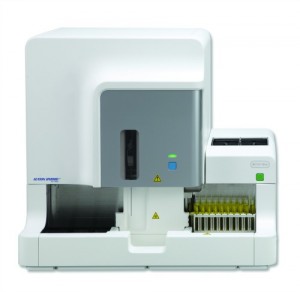
The Arkray Aution Hybrid AU-4050, a fully automated analyzer, integrates proven urine chemistry and flow cytometry technology into the smallest space-saving footprint in the market for true walk-away testing.
Arkray will feature its new Aution Hybrid AU-4050 urine chemistry analyzer. “This fully automated and integrated urine chemistry and flow cytometry sediment analyzer has the smallest space-saving footprint in the market for true walk-away testing,” Dumonceaux says. Among its features are the ability to standardize workflow to reduce tech-to-tech subjectivity; provide double the throughput per inch of bench space over the competition; process up to 200 chemistry tests per hour and automatically enumerate and flag formed elements; minimize operator intervention; and streamline urinalysis testing with automatic reflex testing, no manual dilutions, and minimal maintenance. Efficient and easy to use, it provides high-quality results and improved bacteria detection for better patient outcomes.
Thermo Scientific will promote the fact that its Indiko system analyzers can now participate in the LabLink xL interlab peer group comparison program. “The use of LabLink xL makes it easy for laboratories to harness the full power of our Thermo Scientific MAS line of external controls, and gives them the confidence in their results that peer group comparison can provide,” Gonnelli says.
Mindray North America, based in Redmond, Wash, will showcase its newly upgraded BS200 software, featuring automatic HbA1c assay analysis. While most benchtop analyzers for the HbA1c assay require offline sample preparation—which is both time-consuming and cumbersome—the BS200 does not. “The software eliminates the need for manual preparation of whole blood samples, which saves time,” explains Peggy Chan, MT(ASCP), national marketing manager. “And it’s an effective and safer way to perform clinical testing, minimizing the potential biohazard exposure to patient samples and with less chance for human error.”
Along with the BS200, Mindray will exhibit the BS480 (pending FDA clearance in the United States). The analyzer boasts throughput of 400 tests per hour, and is equipped with new operation software designed to accommodate touchscreen operation. The automated wash station, with glass cuvettes, supports assays with quadruple reagents—meaning it can accommodate assays requiring R1, R2, R3, and R4 procedures. The extensive test menu suits the needs of most clinical settings such as internal medicine, family practice, pain management, and urgent care clinics; student health centers; and hospital satellite laboratories.
For existing analyzers, Beckman Coulter Diagnostics’ focus at the AACC meeting will be on the AU5800 clinical chemistry system. “This analyzer has an enhanced capability to automatically repeat critical samples when connected to automation, resulting in improved sample turnaround time,” Ishii says.
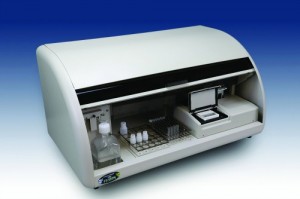
The new ChemWell Fusion analyzer by Awareness Technology is an affordable automated open system with a dual-function reader that automatically switches from reading absorbance to reading chemiluminescence.
ChemWell–T, Awareness Technology’s smallest automatic chemistry analyzer (with throughput of 100 tests per hour), is now available with a barcode reader and an ISE module option. AACC attendees can check out both of these features in the exhibit hall. The ISE module, which measures sodium, potassium, and chloride for serum and whole blood samples, is capable of direct tube sampling.
Nova Biomedical’s pHOx Ultra offers a comprehensive 20-test menu. Individual tests include blood gases (pH, pCO2, pO2, sO2%), hematocrit, hemoglobin, sodium, potassium, chloride, ionized calcium, ionized magnesium, glucose, blood urea nitrogen, creatinine, lactate, bilirubin, and co-oximetry.
Roche’s booth will feature a new intelligent automation solution, the Cobas 8100 automated workflow series, which the company previewed in 2013. “We call it ‘automation without compromise’ because it revolutionizes automation in three specific areas,” Patton says. First, sample transport has been transformed with a multilevel, bidirectional design that separates full samples from empty ones in dedicated lanes, so labs get fast, predictable turnaround times even during peak workflows. Second, the system has an adaptable workflow design so labs can choose workflow with primary samples, with aliquoting, or a mix. Third, it eliminates potential workflow disruptions by giving labs flexible storage options that include midterm storage for hands-free add-on or repeat testing and archiving.
MENU EXPANSIONS AND FEATURE ENHANCEMENTS
Chemistry analyzer manufacturers continue to improve their products to meet the needs of their target markets. As the demand for specialty tests in the therapeutic drug and immunosuppressant diagnostic markets has increased, the availability of skilled medical technologists has decreased due to increasing workloads and time demands. Clinical laboratories are being asked to do more with less. “Multitasking and the automation of testing will help manage technologists’ demands,” Gonnelli says. “Having access to a wide panel of assays can reduce the turnaround time related to send-out testing.”
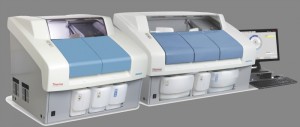
The Indiko and Indiko Plus analyzers are part of the complete system solution provided by Thermo Fisher Scientific.
The Thermo Scientific Indiko system analyzer’s benchtop profile and small footprint make it suitable for any lab. “The ever-expanding menu can provide in-house, on-demand testing for virtually any drug of abuse, therapeutic drug, or immunosuppressant monitoring assay, freeing up space on larger, high-volume instrumentation and reducing send-out testing turnaround times and costs,” Gonnelli says. “The intuitive, graphically driven user interface and plug-and-play system reagents allow busy medical technologists to quickly and easily multitask.”
This year, Indiko system analyzers introduced its most popular therapeutic drug monitoring assays. “Together with our full panel of immunosuppressant drug monitoring assays, the analyzer is suited for specialty testing in hospital laboratories, CLIA-certified POLs, and reference labs,” Gonnelli says.
Awareness Technology is responding to its customers’ requirements for ISE testing; it anticipates that its new ISE module will expand its current market reach. “North America and Europe account for more than 50% of the global market for ion-selective clinical lab analyzers due to their high prevalence and earlier introduction of advanced testing procedures,” Ristaino says. “Asia-Pacific, Latin America, and the Middle East are expected to project the fastest growth in this market due to rapid adoption of such clinical laboratory tests in these regions.”
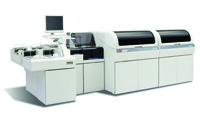
The AU5800 series of clinical chemistry systems from Beckman Coulter Diagnostics has high-capacity rack trays holding a total of 400 samples to maximize walk-away capability.
Beckman Coulter has added capabilities to its AU5800 clinical chemistry system to provide remote instrument diagnostics through its custom ProService remote management system. This Internet-based instrument diagnostics system is available 24/7. ProService provides laboratories with increased instrument uptime and streamlined laboratory operations, and enables the company’s service and support teams to view and diagnose the performance of Beckman Coulter instruments in real time with a greater level of efficiency and accuracy. In addition, the AU5800 series can run 3,800 to 9,800 tests per hour, and its modular design is available in four different configurations. “The high-speed instruments provide the capacity for laboratories to grow without buying more equipment or requiring additional staff,” Ishii says.
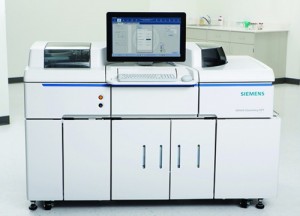
The Advia Chemistry XPT system is the newest chemistry solution from Siemens Healthcare Diagnostics.
Siemens’ Advia Chemistry XPT system is designed to optimize workflow and streamline processes to help customers meet ever-increasing demands to deliver quality diagnostic results quickly, efficiently, and cost-effectively, Langsdorf says.
FINAL THOUGHTS
If you’re unhappy with your current chemistry analyzer or are looking to add to your testing options, consider the current choices. With all of today’s offerings, there is sure to be at least one that meets your lab’s needs.
Karen Appold is a contributing writer for CLP. For further information, contact chief editor Steve Halasey via [email protected].



